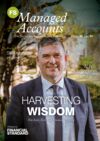JAMIE WILLIAMSONIn pursuit of a new operating structure and "simpler portfolio environment", TCorp has created four new investment roles and will farewell its head of portfolio construction and head of portfolio delivery.
ELIZA BAVINSpeaking at the inaugural Future Investing Forum, experts shared their thoughts on what to expect from the ETF market over the next 12 months.
KARREN VERGARAAfter recently backflipping on changing its high-net-worth investor (HNWI) tests, the UK serves as a cautionary tale for Australia as it mulls overhauling its own wholesale investor thresholds.
JAMIE WILLIAMSONJim Lamborn has retired from the asset consultant after more than two decades on its leadership team.

























